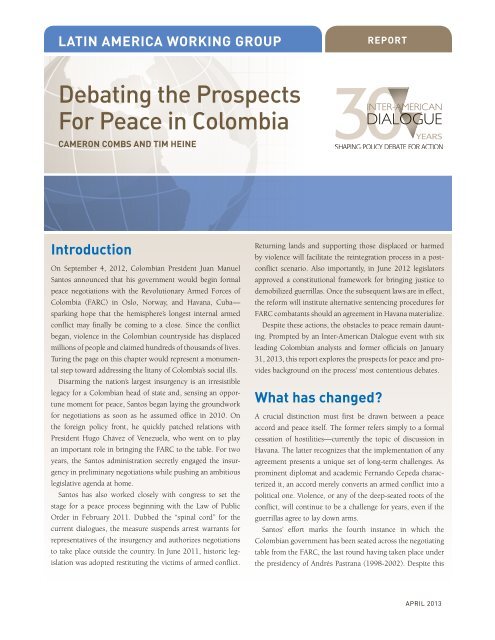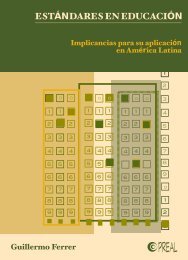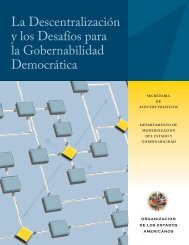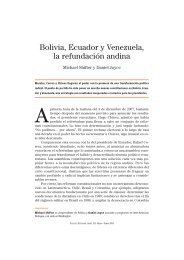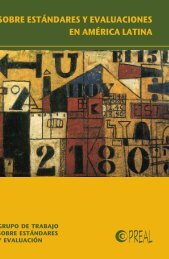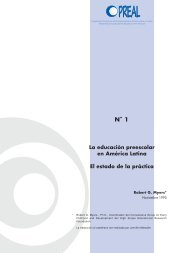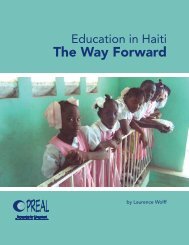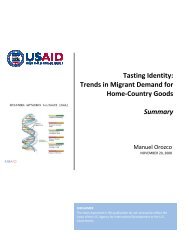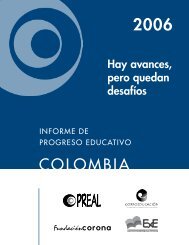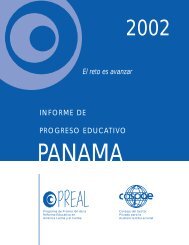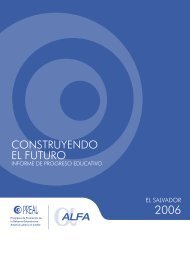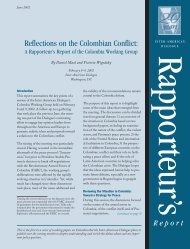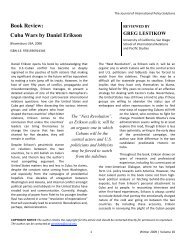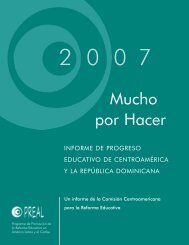Debating the Prospects For Peace in Colombia - Inter-American ...
Debating the Prospects For Peace in Colombia - Inter-American ...
Debating the Prospects For Peace in Colombia - Inter-American ...
You also want an ePaper? Increase the reach of your titles
YUMPU automatically turns print PDFs into web optimized ePapers that Google loves.
Lat<strong>in</strong> America Work<strong>in</strong>g GRoup<br />
Report<br />
<strong>Debat<strong>in</strong>g</strong> <strong>the</strong> <strong>Prospects</strong><br />
<strong>For</strong> <strong>Peace</strong> <strong>in</strong> <strong>Colombia</strong><br />
Cameron Combs and Tim He<strong>in</strong>e<br />
Introduction<br />
On September 4, 2012, <strong>Colombia</strong>n President Juan Manuel<br />
Santos announced that his government would beg<strong>in</strong> formal<br />
peace negotiations with <strong>the</strong> Revolutionary Armed <strong>For</strong>ces of<br />
<strong>Colombia</strong> (FARC) <strong>in</strong> Oslo, Norway, and Havana, Cuba—<br />
spark<strong>in</strong>g hope that <strong>the</strong> hemisphere’s longest <strong>in</strong>ternal armed<br />
conflict may f<strong>in</strong>ally be com<strong>in</strong>g to a close. S<strong>in</strong>ce <strong>the</strong> conflict<br />
began, violence <strong>in</strong> <strong>the</strong> <strong>Colombia</strong>n countryside has displaced<br />
millions of people and claimed hundreds of thousands of lives.<br />
Tur<strong>in</strong>g <strong>the</strong> page on this chapter would represent a monumental<br />
step toward address<strong>in</strong>g <strong>the</strong> litany of <strong>Colombia</strong>’s social ills.<br />
Disarm<strong>in</strong>g <strong>the</strong> nation’s largest <strong>in</strong>surgency is an irresistible<br />
legacy for a <strong>Colombia</strong>n head of state and, sens<strong>in</strong>g an opportune<br />
moment for peace, Santos began lay<strong>in</strong>g <strong>the</strong> groundwork<br />
for negotiations as soon as he assumed office <strong>in</strong> 2010. On<br />
<strong>the</strong> foreign policy front, he quickly patched relations with<br />
President Hugo Chávez of Venezuela, who went on to play<br />
an important role <strong>in</strong> br<strong>in</strong>g<strong>in</strong>g <strong>the</strong> FARC to <strong>the</strong> table. <strong>For</strong> two<br />
years, <strong>the</strong> Santos adm<strong>in</strong>istration secretly engaged <strong>the</strong> <strong>in</strong>surgency<br />
<strong>in</strong> prelim<strong>in</strong>ary negotiations while push<strong>in</strong>g an ambitious<br />
legislative agenda at home.<br />
Santos has also worked closely with congress to set <strong>the</strong><br />
stage for a peace process beg<strong>in</strong>n<strong>in</strong>g with <strong>the</strong> Law of Public<br />
Order <strong>in</strong> February 2011. Dubbed <strong>the</strong> “sp<strong>in</strong>al cord” for <strong>the</strong><br />
current dialogues, <strong>the</strong> measure suspends arrest warrants for<br />
representatives of <strong>the</strong> <strong>in</strong>surgency and authorizes negotiations<br />
to take place outside <strong>the</strong> country. In June 2011, historic legislation<br />
was adopted restitut<strong>in</strong>g <strong>the</strong> victims of armed conflict.<br />
Return<strong>in</strong>g lands and support<strong>in</strong>g those displaced or harmed<br />
by violence will facilitate <strong>the</strong> re<strong>in</strong>tegration process <strong>in</strong> a postconflict<br />
scenario. Also importantly, <strong>in</strong> June 2012 legislators<br />
approved a constitutional framework for br<strong>in</strong>g<strong>in</strong>g justice to<br />
demobilized guerrillas. Once <strong>the</strong> subsequent laws are <strong>in</strong> effect,<br />
<strong>the</strong> reform will <strong>in</strong>stitute alternative sentenc<strong>in</strong>g procedures for<br />
FARC combatants should an agreement <strong>in</strong> Havana materialize.<br />
Despite <strong>the</strong>se actions, <strong>the</strong> obstacles to peace rema<strong>in</strong> daunt<strong>in</strong>g.<br />
Prompted by an <strong>Inter</strong>-<strong>American</strong> Dialogue event with six<br />
lead<strong>in</strong>g <strong>Colombia</strong>n analysts and former officials on January<br />
31, 2013, this report explores <strong>the</strong> prospects for peace and provides<br />
background on <strong>the</strong> process’ most contentious debates.<br />
What has changed<br />
A crucial dist<strong>in</strong>ction must first be drawn between a peace<br />
accord and peace itself. The former refers simply to a formal<br />
cessation of hostilities—currently <strong>the</strong> topic of discussion <strong>in</strong><br />
Havana. The latter recognizes that <strong>the</strong> implementation of any<br />
agreement presents a unique set of long-term challenges. As<br />
prom<strong>in</strong>ent diplomat and academic Fernando Cepeda characterized<br />
it, an accord merely converts an armed conflict <strong>in</strong>to a<br />
political one. Violence, or any of <strong>the</strong> deep-seated roots of <strong>the</strong><br />
conflict, will cont<strong>in</strong>ue to be a challenge for years, even if <strong>the</strong><br />
guerrillas agree to lay down arms.<br />
Santos’ effort marks <strong>the</strong> fourth <strong>in</strong>stance <strong>in</strong> which <strong>the</strong><br />
<strong>Colombia</strong>n government has been seated across <strong>the</strong> negotiat<strong>in</strong>g<br />
table from <strong>the</strong> FARC, <strong>the</strong> last round hav<strong>in</strong>g taken place under<br />
<strong>the</strong> presidency of Andrés Pastrana (1998-2002). Despite this<br />
APRIL 2013
<strong>Inter</strong>-<strong>American</strong> Dialogue<br />
Report<br />
<strong>For</strong>eword<br />
In 2001, <strong>the</strong> <strong>Inter</strong>-<strong>American</strong> Dialogue launched <strong>the</strong> <strong>Colombia</strong> Work<strong>in</strong>g Group, a “bra<strong>in</strong> trust” of top-flight analysts<br />
and former officials from <strong>the</strong> Western Hemisphere and Europe, to debate press<strong>in</strong>g issues and develop<br />
<strong>in</strong>novative policy solutions. The group’s conclusions were dissem<strong>in</strong>ated <strong>in</strong> a series of work<strong>in</strong>g papers aimed<br />
at <strong>in</strong>form<strong>in</strong>g discussion on <strong>the</strong> <strong>Colombia</strong> question. At <strong>the</strong> outset, <strong>the</strong> <strong>in</strong>itiative focused on <strong>the</strong> peace negotiations<br />
between President Andrés Pastrana and <strong>the</strong> Revolutionary Armed <strong>For</strong>ces of <strong>Colombia</strong> (FARC). Although<br />
<strong>the</strong> work<strong>in</strong>g group has s<strong>in</strong>ce evolved and now encompasses a broader, regional agenda, <strong>Colombia</strong> rema<strong>in</strong>s<br />
central to <strong>the</strong> Dialogue’s work.<br />
Eleven years after <strong>the</strong> collapse of <strong>the</strong> first peace talks, <strong>the</strong> adm<strong>in</strong>istration of Juan Manuel Santos has<br />
reopened dialogue with <strong>the</strong> <strong>in</strong>surgency. On January 31, <strong>the</strong> <strong>Inter</strong>-<strong>American</strong> Dialogue <strong>in</strong>vited six prom<strong>in</strong>ent<br />
<strong>Colombia</strong>n analysts—<strong>in</strong>clud<strong>in</strong>g members of <strong>the</strong> orig<strong>in</strong>al work<strong>in</strong>g group—to engage <strong>in</strong> a public debate on <strong>the</strong><br />
prospects for a peace agreement and <strong>the</strong> challenges of implementation. The speakers’ diverse perspectives<br />
offered Wash<strong>in</strong>gton’s policy community a sense of <strong>the</strong> complexity of this undertak<strong>in</strong>g, and what is at stake<br />
for <strong>Colombia</strong>.<br />
This report, prepared by Cameron Combs and Tim He<strong>in</strong>e of <strong>the</strong> <strong>Inter</strong>-<strong>American</strong> Dialogue, takes stock of<br />
<strong>the</strong> debate and seeks to identify key po<strong>in</strong>ts of agreement and disagreement. Combs, a program assistant<br />
who graduated summa cum laude from Carleton College, has written for major publications on a variety of<br />
Lat<strong>in</strong> <strong>American</strong> <strong>the</strong>mes. He<strong>in</strong>e, a research assistant at <strong>the</strong> Dialogue on a Fulbright scholarship, has worked<br />
<strong>in</strong> Bogotá for <strong>the</strong> German Press Agency and holds an MA <strong>in</strong> <strong>Inter</strong>national Relations and Security Studies from<br />
<strong>the</strong> Maxwell School.<br />
The Dialogue is deeply grateful to <strong>the</strong> AlvarAlice Foundation for its generous support of this <strong>in</strong>itiative.<br />
We also extend thanks to <strong>the</strong> first-rate <strong>Colombia</strong>n speakers at <strong>the</strong> January meet<strong>in</strong>g: Fernando Cepeda,<br />
Juanita León, Antonio Navarro, Rafael Nieto, Rodrigo Pardo and Alejandro Santos. <strong>For</strong> access to a video of<br />
<strong>the</strong> January 31 event and <strong>the</strong> <strong>Colombia</strong> Work<strong>in</strong>g Group papers, we <strong>in</strong>vite you to visit <strong>the</strong> Dialogue’s website<br />
(www.<strong>the</strong>dialogue.org).<br />
Michael Shifter<br />
President<br />
2 DEBATING THE PROSPECTS FOR PEACE IN COLOMBIA
<strong>Inter</strong>-<strong>American</strong> Dialogue<br />
Report<br />
legacy of frustrated attempts, many are at least moderately<br />
optimistic. <strong>Colombia</strong> has changed <strong>in</strong> important ways over<br />
<strong>the</strong> last decade, and <strong>the</strong> architects of <strong>the</strong> process have taken<br />
pa<strong>in</strong>s to avoid <strong>the</strong> mistakes of <strong>the</strong> past. Taken toge<strong>the</strong>r, <strong>the</strong><br />
panorama has never seemed more favorable.<br />
A different country<br />
At <strong>the</strong> turn of <strong>the</strong> 21st century, <strong>in</strong>security was rampant <strong>in</strong><br />
<strong>Colombia</strong>. Under <strong>the</strong> Pastrana adm<strong>in</strong>istration, <strong>the</strong> FARC’s<br />
forces were estimated at 18,000 strong while nearly half <strong>the</strong><br />
country lacked a government security presence. In 1999,<br />
<strong>the</strong> Defense M<strong>in</strong>istry reported nearly 2,000 terrorist acts,<br />
more than 3,000 kidnapp<strong>in</strong>gs, and a homicide rate that<br />
exceeded 60 per 100,000 (and peaked three years later at<br />
70 per 100,000). The government, largely on <strong>the</strong> defensive,<br />
lacked serious barga<strong>in</strong><strong>in</strong>g power to push an agreement with<br />
<strong>the</strong> <strong>in</strong>surgency.<br />
The turnaround ushered <strong>in</strong> by Pastrana’s successor,<br />
President Álvaro Uribe (2002–<br />
2010), was dramatic. Bolstered<br />
by some US$7 billion <strong>in</strong> US<br />
assistance, an aggressive military<br />
response vastly dim<strong>in</strong>ished<br />
<strong>the</strong> rebels’ capabilities. Between<br />
2002 and 2009, kidnapp<strong>in</strong>gs<br />
decl<strong>in</strong>ed to just 200 a year,<br />
homicides were halved, and FARC forces were reduced to<br />
roughly 9,000 fighters while many of <strong>the</strong>ir leaders were<br />
captured or killed. Unlike eleven years ago, <strong>the</strong> <strong>in</strong>surgency<br />
is aware that it cannot w<strong>in</strong> this fight through strength of<br />
arms, even if some of its leaders claim o<strong>the</strong>rwise <strong>in</strong> public.<br />
This reality—perhaps more than any o<strong>the</strong>r factor—greatly<br />
improves <strong>the</strong> prospects for an agreement.<br />
Uribe’s efforts to improve security also <strong>in</strong>volved negotiations<br />
with ano<strong>the</strong>r armed group, <strong>the</strong> Autodefensas Unidas<br />
de <strong>Colombia</strong> (AUC). By <strong>the</strong> turn of <strong>the</strong> century, this counter-<strong>in</strong>surgent<br />
response to leftist guerrillas had exacerbated<br />
already rampant violence and was heavily <strong>in</strong>volved <strong>in</strong> <strong>the</strong><br />
drug trade. In 2002, <strong>the</strong> AUC began talks to demobilize<br />
and, over <strong>the</strong> course of several years, more than 31,000<br />
paramilitaries turned over <strong>the</strong>ir weapons. Violence was<br />
reduced, but less than 10 percent of <strong>the</strong> demobilized has<br />
been processed by <strong>the</strong> 2005 <strong>Peace</strong> and Justice Law <strong>in</strong>tended<br />
to re<strong>in</strong>corporate paramilitaries <strong>in</strong>to civilian life, deliver justice<br />
to leaders, and provide restitution for victims. Many<br />
former AUC members also formed new crim<strong>in</strong>al bands (las<br />
bacrim). It is hoped that <strong>the</strong> broader lessons learned from<br />
this, as well as <strong>the</strong> <strong>in</strong>stitutional experience of re<strong>in</strong>tegrat<strong>in</strong>g<br />
demobilized combatants, will facilitate future re<strong>in</strong>tegration.<br />
A different process<br />
Accord<strong>in</strong>g to Cepeda, <strong>the</strong> most promis<strong>in</strong>g difference <strong>in</strong> <strong>the</strong><br />
current process is a more manageable agenda. The six items<br />
<strong>the</strong> two sides agreed to discuss—rural development, <strong>the</strong><br />
FARC’s political participation, an end to <strong>the</strong> conflict, drug<br />
traffick<strong>in</strong>g, victims’ rights, and implementation—are not<br />
<strong>in</strong>tended to resolve <strong>the</strong> larger political, economic, or social<br />
issues that fuel <strong>the</strong> armed conflict. Ra<strong>the</strong>r, <strong>the</strong> primary objective<br />
<strong>in</strong> Havana is to cease hostilities so that larger societal<br />
challenges can be addressed. This stands <strong>in</strong> stark contrast<br />
to <strong>the</strong> much more unwieldy agenda of <strong>the</strong> Pastrana talks,<br />
which consisted of ten articles cover<strong>in</strong>g over 100 issues.<br />
O<strong>the</strong>r improvements to <strong>the</strong> peace process <strong>in</strong>clude:<br />
Unlike eleven years ago, <strong>the</strong> <strong>in</strong>surgency is<br />
aware that it cannot w<strong>in</strong> this fight through<br />
strength of arms, even if some of its leaders<br />
claim o<strong>the</strong>rwise <strong>in</strong> public.<br />
NN<br />
Hold<strong>in</strong>g negotiations abroad. This condition seeks to<br />
<strong>in</strong>crease <strong>the</strong> <strong>in</strong>tegrity of <strong>the</strong> talks by reduc<strong>in</strong>g leaks and<br />
“lower<strong>in</strong>g <strong>the</strong> temperature” <strong>in</strong> <strong>Colombia</strong> itself.<br />
NN<br />
Evaluation and ground rules. In contrast to talks under<br />
<strong>the</strong> Pastrana adm<strong>in</strong>istration, protocol and evaluation<br />
mechanisms have been established. Additionally, Cuba<br />
and Norway are act<strong>in</strong>g as guarantors to <strong>the</strong> process<br />
with Venezuela and Chile as “companions.”<br />
NN<br />
No demilitarized zone. Dur<strong>in</strong>g <strong>the</strong> last round of talks,<br />
<strong>the</strong> government granted <strong>the</strong> FARC a “safe zone”<br />
roughly <strong>the</strong> size of Massachusetts and Connecticut<br />
comb<strong>in</strong>ed. While generous, this gesture ultimately<br />
proved unproductive. The FARC exploited <strong>the</strong> opportunity<br />
to regroup and hide its kidnapped victims without<br />
fear of military <strong>in</strong>cursion. With no demilitarized<br />
areas or ceasefires from <strong>the</strong> Santos adm<strong>in</strong>istration this<br />
time, <strong>the</strong>re is greater pressure on <strong>the</strong> guerrillas to reach<br />
an accord <strong>in</strong> a timely manner.<br />
DEBATING THE PROSPECTS FOR PEACE IN COLOMBIA 3
<strong>Inter</strong>-<strong>American</strong> Dialogue<br />
Report<br />
Restor<strong>in</strong>g <strong>the</strong><br />
<strong>Colombia</strong>n countryside<br />
Land lies at <strong>the</strong> heart of <strong>the</strong> armed conflict. Indeed, as<br />
Alejandro Santos of Semana contends, <strong>the</strong> use and <strong>the</strong><br />
high concentration of ownership of <strong>Colombia</strong>’s countryside<br />
def<strong>in</strong>ed <strong>the</strong> country’s historical trajectory and constitutes<br />
<strong>the</strong> “central <strong>the</strong>me” of <strong>the</strong> FARC’s struggle. It has also<br />
become a flagship issue of <strong>the</strong> Santos adm<strong>in</strong>istration. It is<br />
<strong>the</strong> first item on <strong>the</strong> negotiators’ agenda.<br />
<strong>For</strong>tunately, <strong>the</strong> stated <strong>in</strong>terests of both <strong>the</strong> FARC and <strong>the</strong><br />
Santos adm<strong>in</strong>istration converge <strong>in</strong> several respects. Juanita<br />
León of La Silla Vacía notes that <strong>in</strong> lieu of radical Marxist<br />
proclamations, many positions publicly espoused by <strong>the</strong><br />
FARC are policies <strong>the</strong> government seeks to implement.<br />
Recent FARC communiqués, for <strong>in</strong>stance, have focused on<br />
extend<strong>in</strong>g titles to landowners, <strong>in</strong>creas<strong>in</strong>g rural production,<br />
and restor<strong>in</strong>g lands to <strong>the</strong> forcibly displaced—all of which<br />
are hallmarks of <strong>the</strong> agrarian policy spearheaded by M<strong>in</strong>ister<br />
of Agriculture Juan Camilo Restrepo. Both sides also hope to<br />
redress <strong>the</strong> concentration of land ownership—more than 50<br />
percent of <strong>Colombia</strong>’s land is held by 1 percent of its population—and<br />
to f<strong>in</strong>d alternative uses for drug production areas.<br />
Despite this common ground and months of negotiations,<br />
<strong>the</strong> talks have been unable to move past <strong>the</strong> issue of land,<br />
a reflection of how sensitive it is. Fur<strong>the</strong>rmore, <strong>the</strong> process<br />
threatens some powerful <strong>in</strong>terests, chiefly <strong>the</strong> livestock<br />
<strong>in</strong>dustry. Ranchers hold almost 39 million hectares of land,<br />
opposed to <strong>the</strong> 5 million used for farm<strong>in</strong>g, and have a history<br />
of collaborat<strong>in</strong>g with paramilitaries to expand <strong>the</strong>ir hold<strong>in</strong>gs.<br />
In <strong>the</strong> last few months, <strong>the</strong> ranchers’ guild has mobilized<br />
to s<strong>in</strong>k <strong>the</strong> peace process. And even some <strong>Colombia</strong>ns<br />
who recognize that reform is necessary argue that such a<br />
crucial issue should not be decided with terrorists beh<strong>in</strong>d<br />
closed doors <strong>in</strong> Havana but, ra<strong>the</strong>r, <strong>in</strong> <strong>the</strong> halls of congress.<br />
Reclaim<strong>in</strong>g and restor<strong>in</strong>g rural areas<br />
Establish<strong>in</strong>g an <strong>in</strong>tegral state presence <strong>in</strong> rebel territory constitutes<br />
both a short and long-term challenge. As defense<br />
m<strong>in</strong>ister, Santos <strong>in</strong>itiated a flagship program to build up<br />
non-military <strong>in</strong>stitutions <strong>in</strong> regions seized from <strong>the</strong> guerrillas.<br />
Fund<strong>in</strong>g challenges and bureaucratic <strong>in</strong>ertia have, however,<br />
hamstrung that <strong>in</strong>itiative. Br<strong>in</strong>g<strong>in</strong>g territories back <strong>in</strong>to<br />
<strong>the</strong> government’s fold after decades of <strong>in</strong>dependent operation<br />
is no small feat. It will require both resources and time.<br />
Past experiences, particularly with <strong>the</strong> AUC, show how<br />
destabiliz<strong>in</strong>g demobilizations can be. As exist<strong>in</strong>g security<br />
structures are dismantled, spl<strong>in</strong>ter groups beg<strong>in</strong> to compete<br />
for control. This is particularly true along drug routes, where<br />
illicit revenues are highest and state forces are <strong>the</strong> weakest.<br />
To avoid <strong>the</strong>se power vacuums, Antonio Navarro Wolff, a<br />
national politician and demobilized M-19 rebel, asserts that<br />
<strong>the</strong> FARC must play a role. Police and military forces, for<br />
<strong>in</strong>stance, could absorb guerrilla fighters and employ <strong>the</strong>ir<br />
local knowledge and community ties. However, many<br />
<strong>Colombia</strong>ns resist <strong>the</strong> notion of FARC fighters becom<strong>in</strong>g<br />
soldiers and police officers. Whatever <strong>the</strong> ultimate strategy,<br />
demobilizations alone will not elim<strong>in</strong>ate <strong>the</strong> countryside’s<br />
illegal economies. Policies, <strong>the</strong>refore, must give priority to<br />
citizen security while recogniz<strong>in</strong>g that drug traffick<strong>in</strong>g and<br />
crime will cont<strong>in</strong>ue for <strong>the</strong> foreseeable future.<br />
At <strong>the</strong> same time, efforts must cont<strong>in</strong>ue to develop rural<br />
areas. An astonish<strong>in</strong>gly high percentage of landowners do<br />
not possess property titles, <strong>in</strong>creas<strong>in</strong>g <strong>the</strong>ir vulnerability to<br />
usurpation by armed groups and deny<strong>in</strong>g <strong>the</strong>m a tool for<br />
acquir<strong>in</strong>g credit. The government is try<strong>in</strong>g to rectify this,<br />
but much rema<strong>in</strong>s to be done. Improved <strong>in</strong>frastructure and<br />
land production will not only help to address <strong>Colombia</strong>’s<br />
chronic <strong>in</strong>equality, <strong>the</strong>y will produce viable alternatives to<br />
crime. Jobs must be available for former guerrillas if recidivism<br />
is to be reduced. Yet stigma rema<strong>in</strong>s for ex-combatants<br />
seek<strong>in</strong>g work. It is encourag<strong>in</strong>g that <strong>the</strong> peace process has,<br />
so far, sought to <strong>in</strong>corporate <strong>the</strong> private sector.<br />
Ano<strong>the</strong>r press<strong>in</strong>g security challenge is <strong>the</strong> assurance that<br />
displaced victims can safely return home. Santos’ restitution<br />
law has been <strong>in</strong> effect for a little over a year, and safety<br />
guarantees have already become a major impediment.<br />
Immediate steps must be taken to guarantee that persons<br />
<strong>in</strong>itiat<strong>in</strong>g restitution claims are not threatened by <strong>the</strong> illegitimate<br />
occupants of <strong>the</strong>ir land.<br />
The politics of peace<br />
Negotiat<strong>in</strong>g with an armed <strong>in</strong>surgency represents someth<strong>in</strong>g<br />
of a paradox. In this case, <strong>the</strong> dilemma stems <strong>in</strong> large part<br />
from <strong>the</strong> fact that <strong>the</strong> FARC identifies as a legitimate political<br />
movement, even assert<strong>in</strong>g that its members are <strong>the</strong> true<br />
4 DEBATING THE PROSPECTS FOR PEACE IN COLOMBIA
<strong>Inter</strong>-<strong>American</strong> Dialogue<br />
Report<br />
victims <strong>in</strong> <strong>Colombia</strong>. The rebels may very well reject any<br />
accord that requires recognition of <strong>the</strong>ir crimes or denies<br />
<strong>the</strong>m political participation.<br />
The <strong>Colombia</strong>n public, meanwhile, largely views FARC<br />
members as crim<strong>in</strong>als with political aspirations. When<br />
Santos announced last fall that formal peace talks would<br />
take place, Semana reported that nearly 80 percent of<br />
<strong>Colombia</strong>ns supported his choice. S<strong>in</strong>ce <strong>the</strong> beg<strong>in</strong>n<strong>in</strong>g of<br />
this process, however, equally high marg<strong>in</strong>s oppose <strong>the</strong><br />
FARC participat<strong>in</strong>g <strong>in</strong> politics while ma<strong>in</strong>ta<strong>in</strong><strong>in</strong>g that <strong>the</strong>y<br />
must serve jail time for kidnapp<strong>in</strong>gs, murders, and displacements.<br />
In short, <strong>the</strong> majority of <strong>Colombia</strong>ns view <strong>the</strong><br />
proceed<strong>in</strong>gs <strong>in</strong> Havana not as truce-seek<strong>in</strong>g negotiations<br />
between two legitimate political forces but as <strong>the</strong> FARC’s<br />
opportunity to negotiate <strong>the</strong> terms of its surrender.<br />
The government is caught <strong>in</strong> <strong>the</strong> middle of <strong>the</strong>se clash<strong>in</strong>g<br />
perspectives. On <strong>the</strong> one hand, <strong>the</strong> president wants peace<br />
as quickly as possible. A cessation of hostilities would bolster<br />
his political stand<strong>in</strong>g and<br />
ensure <strong>the</strong> legacy he covets. On<br />
<strong>the</strong> o<strong>the</strong>r hand, <strong>Colombia</strong>ns are<br />
<strong>in</strong>creas<strong>in</strong>gly skeptical of <strong>the</strong> process.<br />
A February 2013 poll by<br />
Datexco found only 20 percent<br />
of citizens believe negotiations<br />
will actually end <strong>in</strong> a deal, down<br />
from a majority just a few months earlier. The quicker an<br />
accord is signed, <strong>the</strong> better for <strong>the</strong> president. Yet <strong>the</strong> more<br />
<strong>the</strong> government presses for <strong>the</strong> FARC to pay for its crimes,<br />
<strong>the</strong> longer negotiations will endure as <strong>the</strong> <strong>in</strong>surgency <strong>in</strong>sists<br />
on leniency.<br />
This places Santos <strong>in</strong> a tough position. Ei<strong>the</strong>r he strikes<br />
a hard l<strong>in</strong>e and faces public ire for prolong<strong>in</strong>g <strong>the</strong> <strong>in</strong>creas<strong>in</strong>gly<br />
unpopular negotiations, or he speeds up <strong>the</strong> talks and<br />
deals with <strong>the</strong> repercussions of grant<strong>in</strong>g concessions to an<br />
<strong>in</strong>surgency with virtually no public sympathy. The government’s<br />
strategy seems to have been <strong>the</strong> sequenc<strong>in</strong>g of <strong>the</strong><br />
agenda. Justice and political participation for <strong>the</strong> FARC will<br />
not be addressed until after common ground is reached on<br />
<strong>the</strong> land issue. If talks move past that po<strong>in</strong>t and <strong>the</strong> public<br />
senses an end to <strong>the</strong> armed conflict, it may become more<br />
<strong>in</strong>cl<strong>in</strong>ed to accept unpopular concessions. Some experts,<br />
however, argue that Santos can employ <strong>the</strong> FARC’s low<br />
popularity to his advantage. If talks succeed, <strong>the</strong> president<br />
can take credit for a historic peace agreement; if <strong>the</strong>y fail,<br />
<strong>the</strong> public will blame <strong>the</strong> <strong>in</strong>surgency and credit Santos for<br />
at least try<strong>in</strong>g to negotiate.<br />
Campaign season<br />
<strong>For</strong> <strong>the</strong> reform to take effect, congress must still<br />
decide how precisely it def<strong>in</strong>es “political” crimes,<br />
how to punish <strong>the</strong>m, and what <strong>the</strong> parameters for<br />
political participation will be.<br />
By codify<strong>in</strong>g a transitional justice framework <strong>in</strong>to law,<br />
congress agreed to allow perpetrators of “political” crimes<br />
to be processed under a different set of procedures than<br />
“normal” crim<strong>in</strong>als. Should <strong>the</strong> conflict end, prosecutors<br />
could only press charges for those “most responsible” for<br />
crimes aga<strong>in</strong>st civilians while giv<strong>in</strong>g lower-rank<strong>in</strong>g soldiers<br />
a free pass. The congress also leaves open <strong>the</strong> possibility<br />
for demobilized guerrilla members to participate <strong>in</strong> politics.<br />
These provisions generated considerable controversy when<br />
<strong>the</strong> law passed <strong>in</strong> June 2012.<br />
But this legal framework rema<strong>in</strong>s, after all, just a framework.<br />
<strong>For</strong> <strong>the</strong> reform to take effect, congress must still<br />
decide how precisely it def<strong>in</strong>es “political” crimes, how to<br />
punish <strong>the</strong>m, and what <strong>the</strong> parameters for political participation<br />
will be. This is a much more contentious issue. These<br />
concepts were <strong>in</strong>itially elaborated <strong>in</strong> very broad terms at a<br />
time when <strong>Colombia</strong>ns did not even know that peace talks<br />
were tak<strong>in</strong>g place. Should an agreement be signed, legislators<br />
will assume responsibility for <strong>the</strong> unpopular concessions<br />
entic<strong>in</strong>g <strong>the</strong> FARC to lay down arms.<br />
And it gets more complicated. Santos has set November<br />
2013 as a deadl<strong>in</strong>e for an agreement. <strong>Colombia</strong>ns will vote,<br />
however, for congress and <strong>the</strong> president <strong>in</strong> March and May<br />
of 2014. If negotiations cont<strong>in</strong>ue right up to <strong>the</strong> deadl<strong>in</strong>e,<br />
congress could f<strong>in</strong>d itself pass<strong>in</strong>g a highly contentious piece<br />
of legislation while <strong>in</strong> full-fledged reelection mode. Uribe<br />
has become <strong>the</strong> most vocal critic of <strong>the</strong> current president<br />
and <strong>the</strong> peace process, lambast<strong>in</strong>g Santos for go<strong>in</strong>g soft on<br />
security and for negotiat<strong>in</strong>g with terrorists. Uribe’s political<br />
mach<strong>in</strong>e is gear<strong>in</strong>g up to field candidates <strong>in</strong> <strong>the</strong> upcom<strong>in</strong>g<br />
elections—he is rumored to be weigh<strong>in</strong>g a run for <strong>the</strong> senate<br />
himself—on a platform that largely opposes preferential<br />
treatment for <strong>the</strong> FARC.<br />
DEBATING THE PROSPECTS FOR PEACE IN COLOMBIA 5
<strong>Inter</strong>-<strong>American</strong> Dialogue<br />
Report<br />
Rafael Nieto, lawyer and former vice m<strong>in</strong>ister of justice,<br />
po<strong>in</strong>ts out that when <strong>the</strong> AUC demobilized, it was barred<br />
from elected office and was supposed to return stolen lands<br />
and goods. The FARC are more political than <strong>the</strong> paramilitaries<br />
ever were, yet both have engaged <strong>in</strong> drug traffick<strong>in</strong>g,<br />
massacres, kidnapp<strong>in</strong>gs, and extortion. Those who share<br />
Nieto’s view—and <strong>the</strong>re are many <strong>in</strong> <strong>Colombia</strong>—do not see<br />
a compell<strong>in</strong>g reason why <strong>the</strong> FARC should be treated more<br />
leniently than o<strong>the</strong>r demobilized <strong>in</strong>surgency groups. It is<br />
because of this po<strong>in</strong>t that former foreign m<strong>in</strong>ister and head<br />
of RCN Noticias, Rodrigo Pardo, is surprised that Santos<br />
chose his first term to <strong>in</strong>itiate this process.<br />
The role of <strong>the</strong><br />
<strong>in</strong>ternational community<br />
Though <strong>the</strong> Pastrana talks <strong>in</strong>volved <strong>the</strong> United Nations, <strong>the</strong><br />
Santos adm<strong>in</strong>istration decided on a far more limited <strong>in</strong>ternational<br />
<strong>in</strong>volvement. Only four countries—Chile, Norway,<br />
Cuba, and Venezuela—are direct participants <strong>in</strong> <strong>the</strong> talks,<br />
although <strong>the</strong> role of external actors will aga<strong>in</strong> prove crucial<br />
both <strong>in</strong> reach<strong>in</strong>g and <strong>in</strong> implement<strong>in</strong>g an agreement.<br />
Santos’ rapprochement with Chávez fostered Venezuela’s<br />
direct <strong>in</strong>volvement <strong>in</strong> <strong>the</strong> negotiations. Those close to <strong>the</strong><br />
process ma<strong>in</strong>ta<strong>in</strong> that Chávez’s <strong>in</strong>fluence and contacts <strong>in</strong> <strong>the</strong><br />
<strong>in</strong>surgency made him <strong>in</strong>strumental <strong>in</strong> br<strong>in</strong>g<strong>in</strong>g <strong>the</strong> FARC<br />
to <strong>the</strong> table. Legitimiz<strong>in</strong>g <strong>the</strong> rebels as a leftist political<br />
force—as well as end<strong>in</strong>g <strong>Colombia</strong>’s armed conflict—would<br />
have been an attractive legacy for <strong>the</strong> Venezuelan leader.<br />
Chávez’s death has <strong>in</strong>jected uncerta<strong>in</strong>ty <strong>in</strong>to this process,<br />
however. Should <strong>in</strong>terim president Nicolás Maduro w<strong>in</strong> <strong>the</strong><br />
presidential election, he would represent a cont<strong>in</strong>uation of<br />
Venezuelan regional policy, but his ability to susta<strong>in</strong> commitment<br />
to <strong>the</strong> peace process may be constra<strong>in</strong>ed by press<strong>in</strong>g<br />
domestic concerns and <strong>in</strong>fight<strong>in</strong>g with<strong>in</strong> <strong>the</strong> chavista<br />
camp. <strong>For</strong> Santos, Venezuelan cooperation will be crucial<br />
to ensur<strong>in</strong>g <strong>the</strong> FARC’s compliance with an agreement.<br />
Indeed, <strong>the</strong> rebels operate camps across <strong>the</strong> border where<br />
leaders direct troops and supervise drug routes.<br />
Hold<strong>in</strong>g talks <strong>in</strong> Havana, long <strong>the</strong> capital of <strong>the</strong> hemisphere’s<br />
leftist revolutionaries, served as a draw for <strong>the</strong><br />
FARC. The island has also ensured a much higher degree of<br />
confidentiality than <strong>in</strong> past processes, enhanc<strong>in</strong>g <strong>the</strong> <strong>in</strong>tegrity<br />
of negotiations by reduc<strong>in</strong>g leaks.<br />
The process counts on <strong>the</strong> support of o<strong>the</strong>r <strong>in</strong>ternational<br />
actors, notably Brasília and Wash<strong>in</strong>gton. This is crucial.<br />
Accord<strong>in</strong>g to Pardo, this <strong>in</strong>volvement allows Santos to “<strong>in</strong>ternally<br />
legitimize a process with polarized public op<strong>in</strong>ion and<br />
a critical opposition.” The FARC undoubtedly will <strong>in</strong>sist on<br />
guarantees that its members will not be extradited on traffick<strong>in</strong>g<br />
charges, as has happened to many—although not all—<br />
demobilized paramilitaries, a po<strong>in</strong>t on which Wash<strong>in</strong>gton<br />
will need to cooperate. The United States will likely cont<strong>in</strong>ue<br />
beh<strong>in</strong>d <strong>the</strong> scenes to help reach an agreement.<br />
Look<strong>in</strong>g forward, both US and regional support will play<br />
a decisive role <strong>in</strong> a post-conflict scenario. The FARC, for<br />
<strong>in</strong>stance, is estimated to command $4 billion <strong>in</strong> annual<br />
revenues and its assets are spread worldwide. Logistical<br />
support <strong>in</strong> locat<strong>in</strong>g <strong>the</strong>se hold<strong>in</strong>gs will be necessary. The<br />
post-conflict environment will also present major f<strong>in</strong>ancial<br />
and adm<strong>in</strong>istrative challenges. Ambitious bureaucratic <strong>in</strong>itiatives,<br />
such as streng<strong>the</strong>n<strong>in</strong>g security, re<strong>in</strong>tegrat<strong>in</strong>g combatants,<br />
and restitut<strong>in</strong>g land, will require susta<strong>in</strong>ed outside<br />
support. F<strong>in</strong>ally, a broad regional strategy for illegal narcotics<br />
is essential <strong>in</strong> curtail<strong>in</strong>g <strong>the</strong> <strong>in</strong>fluence of organized<br />
crime <strong>in</strong> <strong>Colombia</strong>.<br />
F<strong>in</strong>al considerations<br />
There are some grounds for optimism that an agreement<br />
will be reached <strong>in</strong> Havana. Success, however, is far from<br />
assured. Many <strong>Colombia</strong>ns are skeptical of <strong>the</strong> negotiations,<br />
Santos’ popularity is tenuous, and concerns over security are<br />
ris<strong>in</strong>g. As of February 2013, Datexco found that 75 percent<br />
of <strong>Colombia</strong>ns do not believe <strong>the</strong> FARC truly wants peace,<br />
a perception that makes negotiat<strong>in</strong>g with <strong>the</strong> rebels all <strong>the</strong><br />
more difficult for <strong>the</strong> government. It is crucial to assuage<br />
<strong>the</strong> public’s doubts regard<strong>in</strong>g <strong>the</strong> viability of <strong>the</strong> peace process.<br />
In that spirit, current and subsequent adm<strong>in</strong>istrations<br />
will need to make a robust commitment to develop<strong>in</strong>g rural<br />
areas, re<strong>in</strong>tegrat<strong>in</strong>g combatants <strong>in</strong>to society, enhanc<strong>in</strong>g citizen<br />
security, and restitut<strong>in</strong>g victims. These are immense and<br />
important undertak<strong>in</strong>gs that require both resources and<br />
political will. Towards this end, <strong>the</strong> <strong>in</strong>ternational community<br />
must also susta<strong>in</strong> its engagement and support to help<br />
build an endur<strong>in</strong>g peace.
<strong>Inter</strong>-<strong>American</strong> Dialogue<br />
Board of Directors<br />
Michelle Bachelet, Co-Chair, Chile<br />
Carla A. Hills, Co-Chair, United States<br />
Enrique Iglesias, Co-Vice Chair, Uruguay<br />
Thomas F. McLarty III, Co-Vice Chair, United States<br />
David de Ferranti, Treasurer, United States<br />
Peter D. Bell, Chair Emeritus, United States<br />
Fernando Henrique Cardoso, Chair Emeritus, Brazil<br />
Ricardo Lagos, Chair Emeritus, Chile<br />
Alicia Bárcena, Mexico<br />
Francis Fukuyama, United States<br />
L. Enrique García, Bolivia<br />
Donna J. Hr<strong>in</strong>ak, United States<br />
Marcos Jank, Brazil<br />
Jim Kolbe, United States<br />
Thomas J. Mackell, Jr., United States<br />
M. Peter McPherson, United States<br />
Brian O’Neill, United States<br />
Pierre Pettigrew, Canada<br />
Jorge Quiroga, Bolivia<br />
Marta Lucía Ramírez, <strong>Colombia</strong><br />
Eduardo Ste<strong>in</strong>, Guatemala<br />
Martín Torrijos, Panama<br />
Elena Viyella de Paliza, Dom<strong>in</strong>ican Republic<br />
Ernesto Zedillo, Mexico<br />
Billie Miller, Barbados<br />
<br />
Michael Shifter<br />
President
The <strong>Inter</strong>-<strong>American</strong> Dialogue is <strong>the</strong> lead<strong>in</strong>g US center for policy analysis, exchange, and communication<br />
on issues <strong>in</strong> Western Hemisphere affairs. The Dialogue br<strong>in</strong>gs toge<strong>the</strong>r public<br />
and private leaders from across <strong>the</strong> Americas to address hemispheric problems and opportunities.<br />
Toge<strong>the</strong>r <strong>the</strong>y seek to build cooperation among Western Hemisphere nations and<br />
advance a regional agenda of democratic governance, social equity, and economic growth.<br />
The Dialogue’s select membership of 100 dist<strong>in</strong>guished citizens from throughout <strong>the</strong><br />
Americas <strong>in</strong>cludes political, bus<strong>in</strong>ess, academic, media, and o<strong>the</strong>r nongovernmental leaders.<br />
Sixteen Dialogue members served as presidents of <strong>the</strong>ir countries and more than two dozen<br />
have served at <strong>the</strong> cab<strong>in</strong>et level.<br />
Dialogue activities are directed to generat<strong>in</strong>g new policy ideas and practical proposals for<br />
action, and gett<strong>in</strong>g <strong>the</strong>se ideas and proposals to government and private decision makers.<br />
The Dialogue also offers diverse Lat<strong>in</strong> <strong>American</strong> and Caribbean voices access to US policy discussions.<br />
Based <strong>in</strong> Wash<strong>in</strong>gton, <strong>the</strong> Dialogue conducts its work throughout <strong>the</strong> hemisphere.<br />
A majority of our Board of Directors are from Lat<strong>in</strong> <strong>American</strong> and Caribbean nations, as are<br />
more than half of <strong>the</strong> Dialogue’s members and participants <strong>in</strong> our o<strong>the</strong>r leadership networks<br />
and task forces.<br />
S<strong>in</strong>ce 1982—through successive Republican and Democratic adm<strong>in</strong>istrations and many<br />
changes of leadership elsewhere <strong>in</strong> <strong>the</strong> hemisphere—<strong>the</strong> Dialogue has helped shape <strong>the</strong><br />
agenda of issues and choices <strong>in</strong> <strong>in</strong>ter-<strong>American</strong> relations.<br />
1211 Connecticut Avenue, NW, Suite 510<br />
Wash<strong>in</strong>gton, DC 20036<br />
PHONE: 202-822-9002 n FAX: 202-822-9553<br />
EMAIL: iad@<strong>the</strong>dialogue.org n WEB SITE: www.<strong>the</strong>dialogue.org


